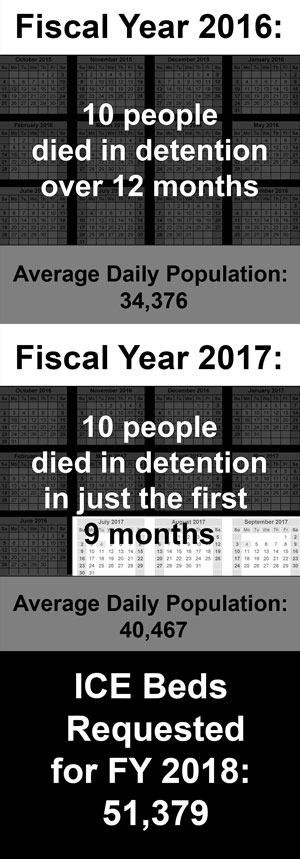When President Trump released his budget proposal, most public attention focused on his desire to spend billions of dollars to expand his deportation apparatus.
Those costs include:
- An overall request for $7.9 billion for U.S. Immigration and Customs Enforcement (ICE), $1.8 billion more than in fiscal year (FY) 2017
- $2.7 billion to maintain 51,379 detention beds, an increase of $1.2 billion
- $177 million to keep about 79,000 immigrants under surveillance outside of detention, through alternative custody programs such as ankle shackles and check-in programs
- $185 million to hire about 1,000 deportation officers, support staff, and prosecutors
But Trump’s budget does not just fund a massive expansion of the immigration detention system; it proposes a much more extensive deconstruction of the system that lowers the standards jails must meet to contract with the federal government to hold immigrants. With the rate of immigrant deaths in detention increasing at an alarming rate (seven people have died in ICE custody since Trump took office, as of the publication of this post), the need to challenge these proposals is urgent.

ICE’s history of failed detention oversight
The Department of Homeland Security’s (DHS) failed oversight of ICE detention facilities and its inability to protect the health and wellbeing of detained immigrants has been documented extensively in recent years by NIJC and other nongovernmental organizations. These reports demand a significant reduction in the government’s reliance on detention as an immigration enforcement tool. They also conclude that ICE needs to implement more robust standards, improve detention center oversight, and increase penalties for jails that fail to meet ICE standards. In response to these reports, there were some indications that DHS under the Obama administration was considering steps to move the ICE detention system toward better accountability and more humane practices.
The Trump administration’s budget is a major step backward. Its goal: rapidly increase the incarceration of immigrants in remote county jails, in part by rolling back basic safety and civil rights standards it considers an undue burden on jail operators.
As immigrants are dying in detention at an alarming rate, Trump is asking Congress to make the following changes to the way ICE runs the detention system (see pages 138 to 140 of ICE’s budget request to Congress):
1. Severely limit what facilities are subject to ICE’s most current detention standards. Only “dedicated” ICE facilities that hold immigrants for more than a week would be required to comply with the 2011 Performance-Based National Detention Standards (PBNDS 2011), ICE’s most recent and robust set of standards.
2. Rewrite human rights standards for the majority of ICE detention centers. “Non-dedicated” facilities – typically local jails that also hold people serving criminal sentences – would be subject to lesser standards, yet to be drafted by the administration. The budget request states these standards would be “consistent with” those used in U.S. Marshals and Bureau of Prisons facilities. Immigration detention is civil detention and should not rely on the same standards that govern incarceration in the criminal justice system. Even with the civil detention standards already in place, studies have found that detention is unduly traumatizing for asylum seekers and other survivors of trauma and is fraught with abuse and medical negligence.
3. Permit hundreds of short-term immigrant processing centers to hold immigrants up to a week. These facilities would be exempt from the majority of ICE detention standards, and would only be required to abide by “a set of minimum requirements.” They would be allowed to self-assess their own compliance.
NIJC calls on Congress to use its appropriations powers to force DHS to shrink the detention system and halt the further erosion of human rights protections for immigrants. Taxpayer dollars should not be used to detain men, women, or children in a system that endangers human lives and makes a mockery of due process.

